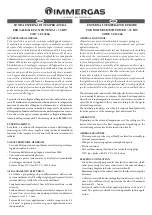
11
3 INSTALLATION
Before
connecting
the boiler, perform the following operations:
•
Thoroughly clean all the
system pipes
in order to remove any foreign matter that could affect correct op-
eration of the boiler;
•
Check that the
flue
has an
adequate draught
, that there is no narrowing of passages and that it is free
from debris; also check that other appliances do not discharge into the flue (unless designed to serve
several utilities). See the regulations in force.
3.1 THERMAL PLANT
3.1.1 BOILER
ROOM
As a rule, regulations in force should be always observed. Premises in which boilers will be installed should be suffi-
ciently ventilated and guarantee access for ordinary and extraordinary maintenance operations.
3.1.2 FLUE
The pressurised boiler that now equips your heating system is so-called because it uses a burner provided
with fan which introduces into the combustion chamber the exact amount of air necessary in relation to the
fuel and maintains an overpressure in the furnace equivalent to all the internal resistances of the flue gas
path as far as the boiler exhaust. At this point the fan pressure should have dropped to zero to prevent the
flue connection pipe and the lower area of the flue itself from being under pressure and combustion gas
leaks occurring in the boiler room.
The
connection pipe
from the boiler to the base of the flue must slope upwards in the direction of the flue
gas flow with recommended gradient of no less than 10%. Its path must be as short and straight as possible
with the bends and fittings rationally designed in accordance with air duct criteria
The paragraph Technical Specifications specifies the flue connection diameters of the boilers for lengths of
up to 1 metre. For more winding paths, the diameter must be suitably enlarged.













































